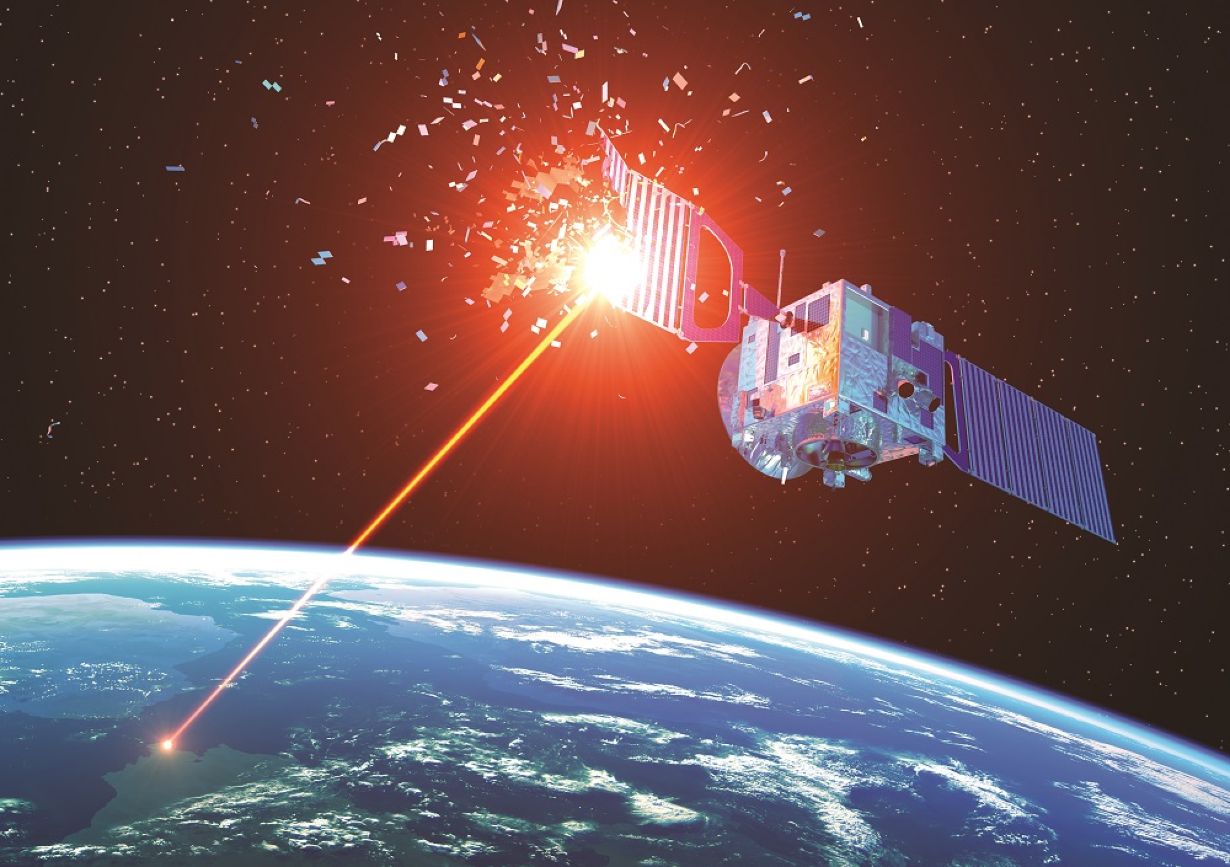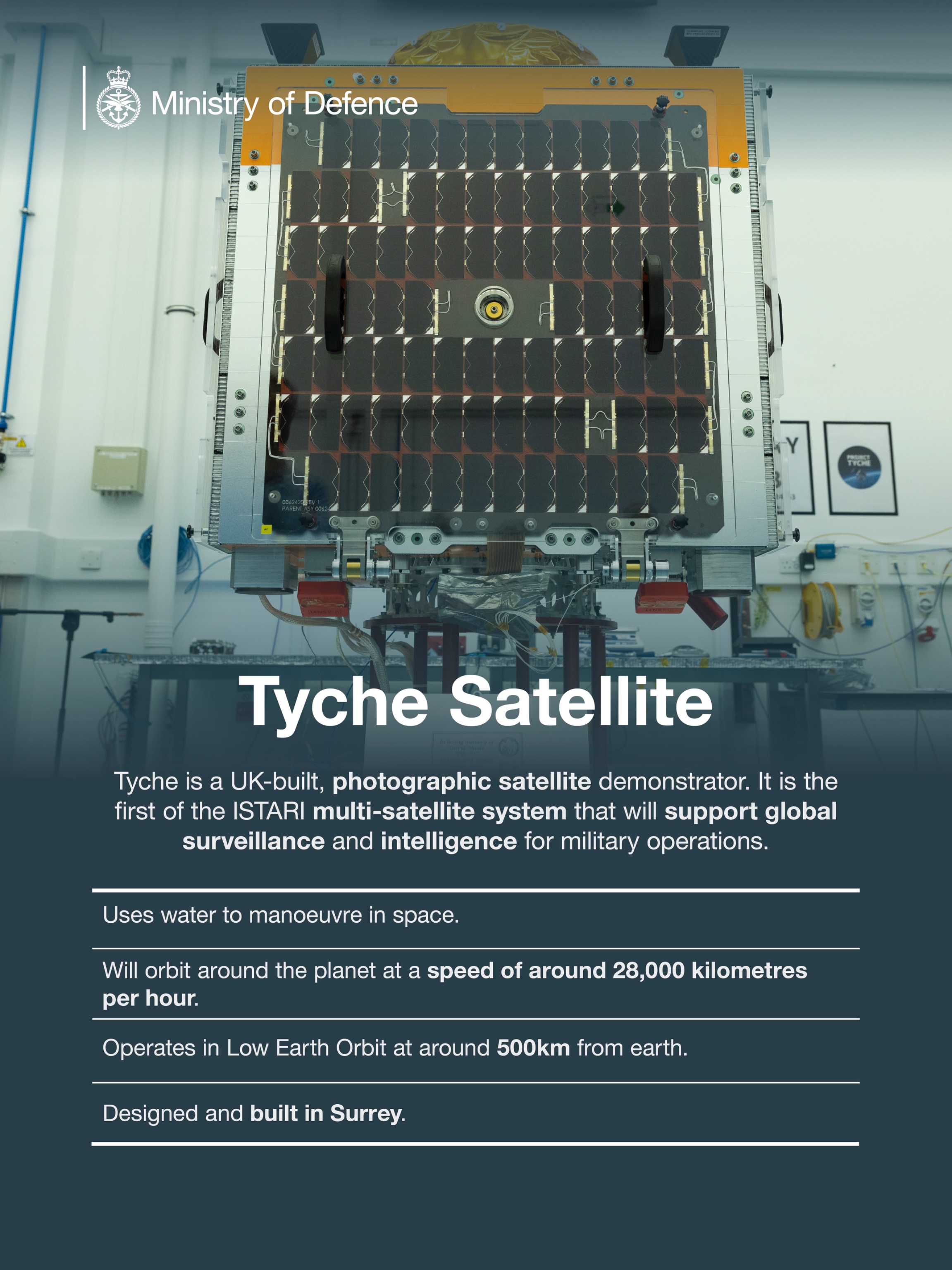The United Kingdom held its inaugural space war games, called ‘Space Warrior,’ at the Defence Experimentation and Wargaming Hub located at Southwick Park in Hampshire.
A press release published by the Royal Air Force (RAF) on July 29 stated that staff from across the Ministry of Defence (MoD), industry, and international partners and allies participated in the war games. UK Space Command Commander Major General Paul Tedman oversaw the exercise.
The war game explored how the UK MoD’s own space-based Intelligence, Surveillance, and Reconnaissance (ISR) capabilities, such as those of Program ISTARI, which is due to supply a constellation of defense satellites for space-based ISR by 2031, can operate in synergy with commercial space-based ISR capabilities.
The service did not provide specific details about how these war games were held.
The British MoD is looking at bolstering its space surveillance in anticipation of a conflict that could escalate and reach space, especially by including industry partners. This is reflected in the statement made by the UK Space Commander.
The Commander of the UK Space Command said: “Space Warrior has provided critical insights into what on-orbit ISR capability we need and how much. Crucially, it has also evaluated whether we should own the capability, access it through commercial, or collaborate with allies. I’m grateful to our industrial partners and military allies for their participation, input, and support. Space is a team sport.”
Allen Antrobus, Chair of the Security and Defence Committee at UK Space, lauded the event and called it a significant milestone.
“UK Space Command’s inaugural Space Warrior Wargame was a timely and well-run event as we head into the next Strategic Defence Review. The inclusion of colleagues from across the industrial sector was an important step forward in demonstrating the MOD’s commitment to listen and engage with the wider defense industrial base,” Antrobus said.
The UK Space Command has participated in several international exercises and war games since its establishment in 2021. The press release also stated that “Space Warrior” will be a regular event that will strengthen the bonds and comprehension between UK Space Command, its partners, allies, and the industry.

The space war games organized by the UK are noteworthy as they mark the country’s inaugural event in this area, particularly given its regular involvement in various war games across all three domains of air, sea, and land warfare. Earlier this year, British forces participated in the largest NATO military exercises in a generation. In fact, the British troops led the NATO war games on Estonia’s border with Russia in a spectacular show of force.
In recent years, the United Kingdom has begun to investigate space-based defense seriously. In October 2022, a UK Parliamentary committee urged the government to appoint a Minister for Space “to provide clear centralized direction and accountability in taking forward the UK’s civil and defense ambitions in space.”
In 2022, the UK Ministry of Defence unveiled the Defense Space Strategy, outlining plans for the coming years that primarily emphasize ISR capabilities in response to challenges from adversaries in space. The growing concerns about the potential vulnerability of military space systems have led the UK to invest in developing and acquiring its own space-based ISR capabilities.
UK’s Space Strategy Takes Shape
UK’s first Defence Space Strategy was published in February 2022 to address growing threats. It focused on how the defense would safeguard the United Kingdom’s national interests in space in an era of space-based threats and the looming danger of space warfare.
The £1.4 billion investment included a £968 million commitment over 10 years to build the ISTARI Programme, a multi-satellite system that is expected to provide increased worldwide surveillance and intelligence for military operations.
The document also allocated an additional £61 million to investigate the use of advanced laser communications technology to transmit data from space to Earth at a rate comparable to super-fast broadband.
This year, the UK Space Command is scheduled to launch its first satellite. Under Programme ISTARI, a network of new satellites will be created, the first of which will be Tyche. It is a 150-kilogram research and development satellite that will spend its five-year lifespan in Low Earth Orbit.
Tyche possesses an electro-optical sensor, a high-resolution camera that allows it to snap pictures of the Earth’s surface throughout the day from space. It was designed and constructed in the UK as part of a £22 million contract with Surrey Satellite Technology Ltd. It will be launched by SpaceX from Vandenberg Space Force Base in California.
One of the main goals of the ISTARI program strategy is to strengthen bilateral and multilateral relations with the UK’s Five Eyes partners (Australia, Canada, New Zealand, the United States, and the United Kingdom), particularly the US as the primary partner.
Russia’s all-out assault on Ukraine has brought attention to just how vulnerable space systems might be to enemy targeting. As the 2022 invasion progressed, British and US intelligence authorities claimed that Russia was responsible for a cyberattack against commercial communications satellite provider Viasat.
Additionally, defense strategists in the West are concerned about the Chinese People’s Liberation Army’s (PLA) growing efforts to use space for military operations. Since 2005, when an anti-satellite system was tested, Beijing has increased its spending on space systems and shown interest in counter-space technology.
According to a Pentagon space policy paper published last year, the PLA “is developing, testing, and fielding capabilities intended to target US and allied satellites.”
According to the document, these capabilities included the following: “Direct-ascent anti-satellite (DA-ASAT) missiles that can target satellites in low Earth orbit (LEO); electronic warfare to suppress or deceive enemy equipment; and ground-based laser systems that can disrupt, degrade, and damage satellite sensors.”
This propelled the UK and the US to strengthen their space-based capabilities. The then assistant head for strategy and operations in the British Ministry of Defence, Group Captain Dave Keighley, said in December 2023: “The threats are very real. The threats are today, and they affect the entire space ecosystem.”

Further, the British policy paper on National Space Strategy published earlier noted: “As the opportunities have grown, so too have the threats; our potential adversaries are developing capabilities that will put our people, equipment and information networks at risk and make it harder to protect the UK. Space is changing, the UK must respond.”
Even more evidence of increased investment in space systems can be found in the UK’s efforts to increase its capability for space-based satellite imaging after decades of reliance on the US. Once the launch of Tyche is complete, the UK will focus on SAR (Synthetic Aperture Radar) constellation Oberon, which is scheduled to debut in 2025, and another EO (Earth Observation) system, Juno, in 2026.
In December 2023, Australia, the UK, and the US announced that they would collaborate to develop a Deep Space Advanced Radar Capability, which would allow for the detection, tracking, and characterization of objects in geosynchronous orbit and beyond. The three nations are planning to install the all-weather capable sensors that support this capability.
At that time, British Defence Secretary Grant Shapps stated, “The UK and our allies must ensure we have the advanced capabilities we need to keep our nations safe as the world becomes more contested and the danger of space warfare increases.
Having said that, the UK is equally invested in keeping a vigil and enhancing ISR in its low-earth orbit as it is in securing deep space from adversarial activity.
- Contact the author at sakshi.tiwari9555 (at) gmail.com
- Follow EurAsian Times on Google News





